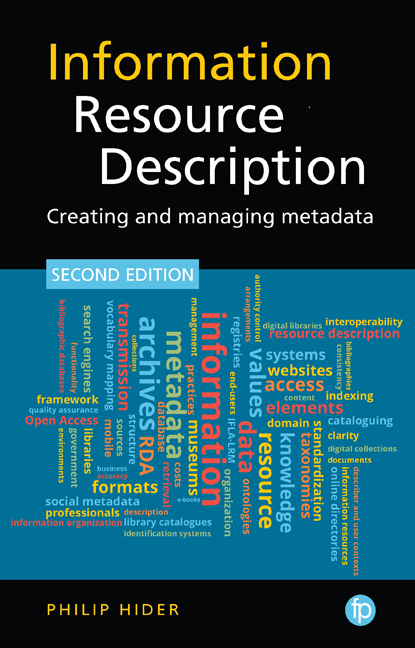Book contents
- Frontmatter
- Dedication
- Contents
- List of figures and tables
- Preface to the First Edition
- Preface to the Second Edition
- List of abbreviations
- 1 Definitions and scope
- 2 Information resource attributes
- 3 Tools and systems
- 4 Metadata sources
- 5 Metadata quality
- 6 Sharing metadata
- 7 Metadata standards
- 8 Vocabularies
- 9 The future of metadata
- Further reading
- List of metadata standards
- Index
- Frontmatter
- Dedication
- Contents
- List of figures and tables
- Preface to the First Edition
- Preface to the Second Edition
- List of abbreviations
- 1 Definitions and scope
- 2 Information resource attributes
- 3 Tools and systems
- 4 Metadata sources
- 5 Metadata quality
- 6 Sharing metadata
- 7 Metadata standards
- 8 Vocabularies
- 9 The future of metadata
- Further reading
- List of metadata standards
- Index
Summary
Introduction
In the previous chapter we looked at some important standards pertaining to the elements, format and transmission of metadata. This chapter looks at the standardisation of metadata values. Prescribed sets of values are often referred to as vocabularies. They may be used for indexing, for display or both. Many vocabularies are designed to cover a particular knowledge domain, and to describe the subject of information resources. Sometimes they are called knowledge organization systems. Zeng and Chan (2003, 377) define such systems as ‘tools that present the organised interpretation of knowledge structures’. Vocabularies have also been developed for other elements, apart from subject.
The values used to describe a resource are always relative, that is, they allow resources to be compared and contrasted with each other. Controlled vocabularies enable resources to be organised systematically into groups. Other value systems are quantitative in nature, applying some form of measurement. There are also systems that prescribe a unique value to each resource for the purposes of identification rather than selection. We shall take another look at systems of identification towards the end of the chapter. First, however, we shall discuss the various types of controlled vocabulary that have been developed to describe and organise information resources, starting with those used to describe their subject.
Controlled subject vocabularies
An information resource's subject can, of course, be described in uncontrolled, natural language. Abstracts, for example, usually indicate what journal articles and other academic papers are about. We have already observed, however, that the standardisation of vocabulary (beyond simply specifying that it should be in a particular natural language, such as English) can improve retrieval, especially if both indexer and searcher use the same controlled vocabulary. The aim is for each concept to be represented by one, and only one, particular term, and for each term to mean only one particular concept.
The application of controlled vocabularies, especially subject vocabularies, is not necessarily so straightforward. This is partly because of the limitations of any given vocabulary and partly because of the nature of what is being described. The ‘subject’ of a resource is not always something that can be easily identified, and is ultimately a matter of judgement: it will be viewed differently by different people.
- Type
- Chapter
- Information
- Information Resource DescriptionCreating and Managing Metadata, pp. 175 - 214Publisher: FacetPrint publication year: 2018



